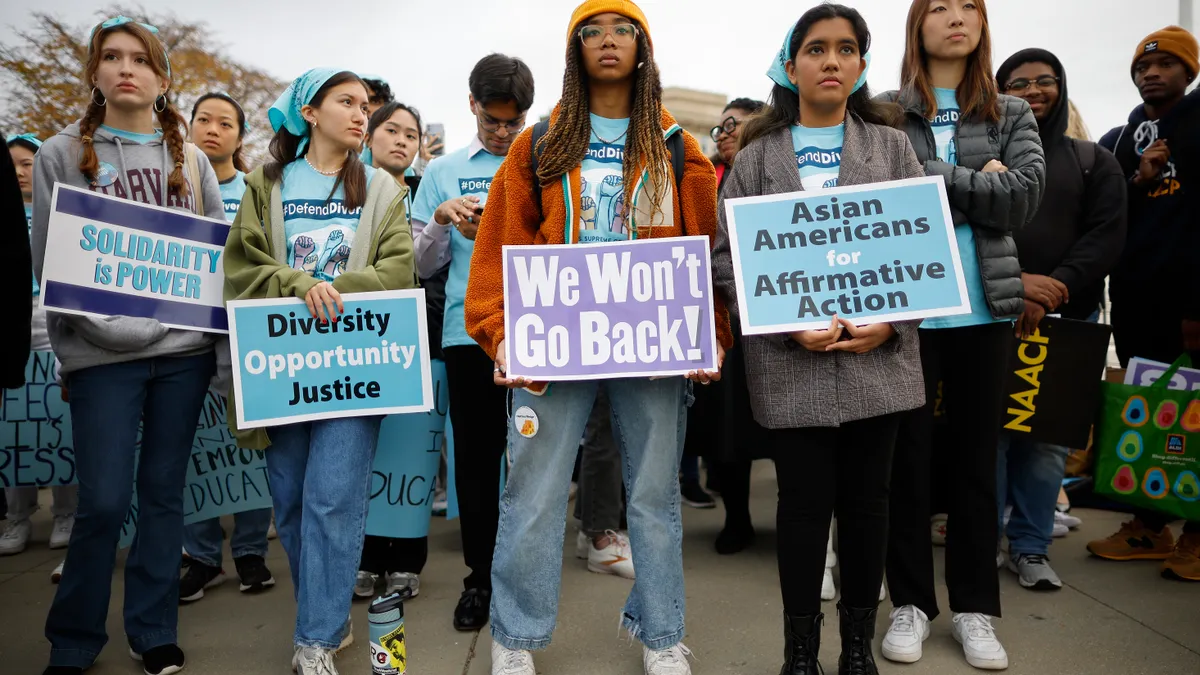The U.S. departments of Education and Justice are calling on colleges to partner with school districts to bolster resources and programs for students of color, in direct response to the recent U.S. Supreme Court ruling overturning race-conscious admissions.
"By partnering with school districts in underserved communities, supporting improved access to high quality advanced courses, and investing time and resources into programs that identify and nurture students’ potential, colleges and universities can ensure that more students will be prepared to apply to colleges and universities, gain admission, succeed, and graduate," the departments said in a Dear Colleague letter Monday.
School districts should partner with higher education institutions to support improved access to high quality advanced courses and invest in programs that identify and nurture students' potential so they can be prepared to apply, attend and graduate from college, the departments said.
"Students from disadvantaged backgrounds, who are disproportionately students of color, are more likely to attend PreK-12 schools that lack the particular courses, types of instruction, and enrichment opportunities that prepare students for college, and that colleges and universities seek in their admissions process," wrote Catherine Lhamon, assistant secretary for civil rights at the U.S. Department of Education, and Kristen Clarke, assistant attorney general for the Department of Justice.
The departments said higher education institutions can still keep in place holistic application-review processes. As such, they can look at students' individual backgrounds — including their experiences related to race, racial discrimination, or racial composition of their neighborhoods and schools.
In the upcoming admissions cycle, the departments encouraged colleges and universities to still focus on their most valued attributes in students, including:
- Hard work.
- Achievement.
- Intellectual curiosity.
- Potential.
- Determination.
Evaluating how a student persevered in the face of adversity or disadvantage can still be a part of that, they said.
"For example, a university could consider an applicant’s explanation about what it means to him to be the first Black violinist in his city’s youth orchestra or an applicant’s account of overcoming prejudice when she transferred to a rural high school where she was the only student of South Asian descent," the departments shared in a Q&A document accompanying Clarke and Lhamon's letter.
"An institution could likewise consider a guidance counselor or other recommender’s description of how an applicant conquered her feelings of isolation as a Latina student at an overwhelmingly white high school to join the debate team," the Q&A continued.
The departments released the resources to help college leaders navigate the Supreme Court's June decision striking down race-conscious admissions. The high-profile case was brought against Harvard and the University of North Carolina-Chapel Hill by students who claimed the university's race-conscious admissions policies were unconstitutional under the 14th Amendment.
The resulting controversial 6-3 decision upended decades of policies that higher education institutions have used to admit students in efforts to diversify their campuses, and left educators and high school counselors navigating new waters as they guide students through the college application process.
In a press call on Monday morning, U.S. Secretary of Education Miguel Cardona pointed out how state-level decisions to overturn affirmative action have been shown to negatively impact students of colors' college applications and eventual admission to college.
"We cannot afford that kind of backsliding on a national scale," he said.












